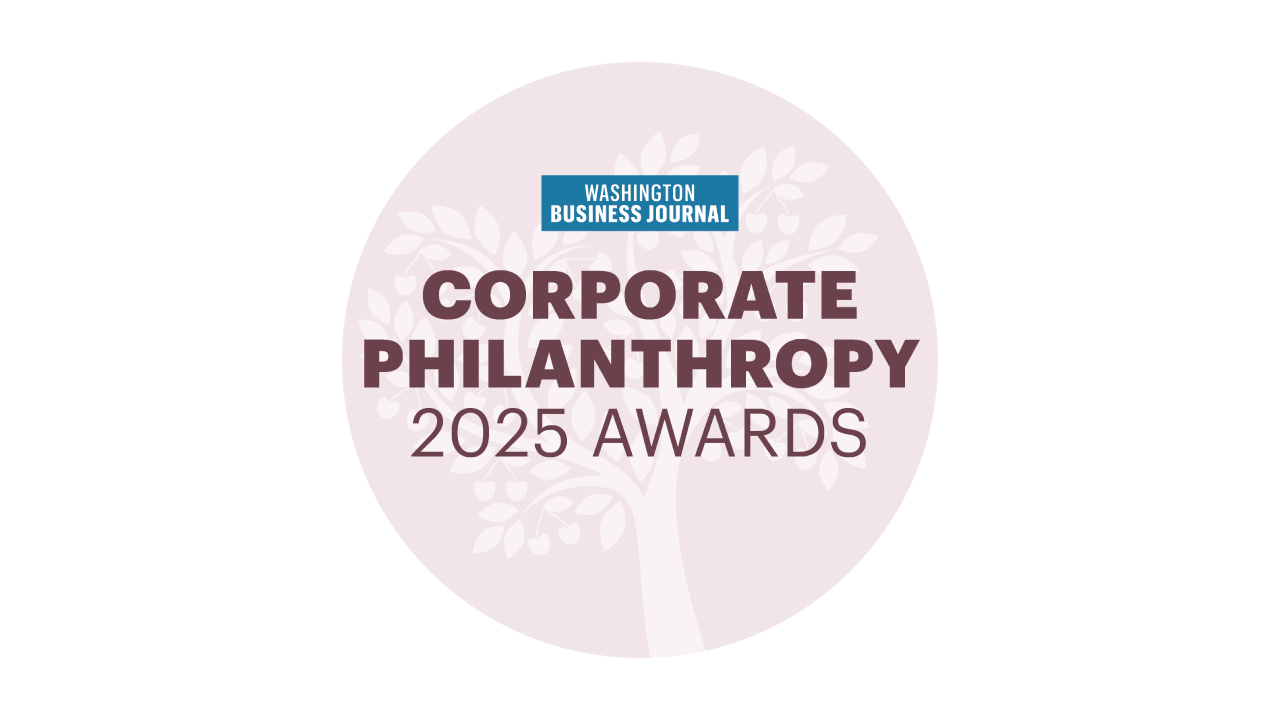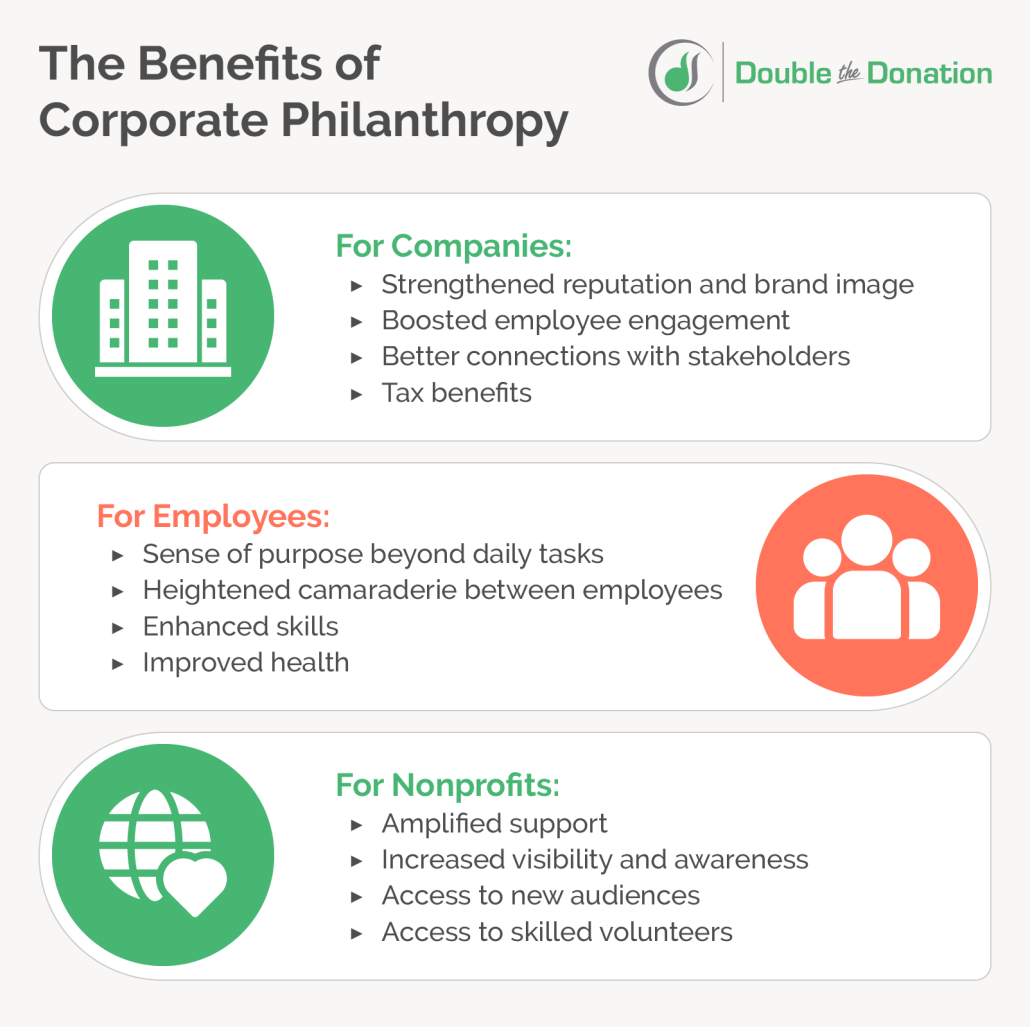Why staff participation enhances corporate philanthropy outcomes
Wiki Article
Why Corporate Philanthropy Matters: An Overview to Business Social Responsibility
Corporate philanthropy serves as an important part of company social responsibility. It mirrors a firm's dedication to societal problems and boosts its public picture. Organizations involving in kind efforts frequently see enhanced worker spirits and more powerful area ties. The real influence of these initiatives can be intricate and complex. Understanding the subtleties of corporate philanthropy can illuminate its relevance in today's service landscape. What are the critical aspects that drive its success?The Meaning of Corporate Philanthropy
Corporate philanthropy describes the philanthropic payments and campaigns embarked on by businesses to sustain social reasons and neighborhood advancement. This principle incorporates a variety of tasks, consisting of economic donations, employee volunteer programs, and in-kind gifts of service or products. Companies take part in philanthropy to deal with social problems such as education and learning, healthcare, environmental sustainability, and hardship relief.Typically, company philanthropy is structured through formal programs or collaborations with nonprofit organizations, permitting businesses to leverage their resources efficiently. These efforts frequently aim to make a positive effect on the neighborhood while straightening with the business's values and mission. In addition, business philanthropy shows a commitment to business social responsibility, showcasing how services can add to society beyond revenue generation. By taking part in kind efforts, firms can play a significant function in promoting social change and dealing with community needs.
Benefits of Corporate Philanthropy for Businesses
Taking part in company philanthropy offers various advantages for businesses, improving their online reputation and cultivating more powerful area ties. Business that actively get involved in humanitarian initiatives commonly experience increased employee morale and loyalty. When workers regard their company as socially liable, they are most likely to really feel pleased of their office, causing higher levels of task contentment and retention.Moreover, company philanthropy can develop valuable networking opportunities. Teaming up with non-profits and area organizations enables services to get in touch with similar people and teams, potentially resulting in collaborations that can benefit both parties. Furthermore, organizations took part in philanthropy may locate themselves more enticing to stakeholders and capitalists that focus on ethical practices.
Ultimately, company philanthropy not just sustains social needs yet also gives substantial advantages to services, producing a win-win situation that advertises development and sustainability while adding positively to the globe.
Enhancing Brand Name Commitment Via Social Duty
Enhancing brand commitment via social obligation involves building trust fund with customers by straightening business actions with neighborhood worths (corporate philanthropy). Companies can promote much deeper connections via neighborhood involvement campaigns that reverberate with their target market. In addition, genuine brand narration can better enhance commitment by showcasing authentic commitment to social causesBuilding Depend On With Activity
Building trust fund through action is a powerful strategy that firms can carry out to strengthen brand name loyalty and foster much deeper links with customers. When businesses actively participate in company philanthropy, they show a dedication to ethical techniques and social obligation. This aggressive strategy not just enhances their reputation but also resonates with consumers who prioritize worths placement. Openness in humanitarian initiatives is important; business should properly interact their campaigns and the influence they are making. Credibility plays a significant role as well; consumers are much more most likely to sustain brands that really appreciate social problems instead of those that take part in superficial marketing. Eventually, by prioritizing purposeful activities over plain words, companies can nurture long-lasting depend on and commitment among their customer base.Area Involvement Efforts

Authentic Brand Storytelling
Neighborhood interaction campaigns usually function as a structure for authentic brand name corporate philanthropy narration, which plays a considerable role in growing brand name loyalty. By sharing authentic stories about their social obligation initiatives, companies can attach emotionally with customers. These stories highlight the brand's values, mission, and dedication to societal enhancement, cultivating trust fund and relatability. When customers regard a brand name as socially liable, they are more probable to create a much deeper fondness and preference for it. Genuine storytelling also motivates transparency, welcoming customers to involve with the brand name on an individual level. Therefore, services not just enhance their reputation but additionally construct enduring partnerships with their target market, eventually leading to enhanced commitment and advocacy in an open marketThe Role of Employees in Corporate Philanthropy
Workers play an important function fit a business's humanitarian efforts through their involvement and engagement. Effective staff member engagement methods can improve volunteerism, causing purposeful area impact. As organizations harness the collective power and interest of their workforce, they can promote a society of considering that expands beyond the workplace.Employee Involvement Techniques
Involvement in corporate philanthropy cultivates a feeling of function that prolongs beyond simple profit-making. Companies can boost staff member participation by carrying out numerous methods that encourage participation in kind campaigns. One reliable method is to develop a coordinating gift program, where the business matches worker contributions to qualified charities, magnifying their impact. Additionally, routine interaction regarding humanitarian efforts can create recognition and motivate employees to contribute their time and resources. Moreover, offering platforms for employees to share their charitable rate of interests fosters a sense of possession and community. Recognizing and awarding workers for their philanthropic payments can also strengthen a culture of providing, ultimately bring about a more engaged workforce straightened with the business's social responsibility objectives.Volunteerism and Neighborhood Effect
Company philanthropy flourishes when people actively join volunteerism, directly influencing the neighborhoods they serve. Worker participation in volunteer efforts not just boosts business culture however likewise cultivates a sense of objective and connection among team. Through volunteering, workers develop necessary abilities, such as team effort and management, which can convert right into boosted job efficiency. In addition, when employees unite for area causes, they reinforce their bond with the organization, improving overall morale and loyalty. Organizations that encourage volunteerism usually see a favorable public image, as community engagement reflects their commitment to social obligation. Eventually, the cumulative effect of employee volunteer initiatives can transform communities, dealing with pressing social concerns while strengthening company worths and objective.
Measuring the Effect of CSR Initiatives
As organizations significantly spend in business social responsibility (CSR) campaigns, understanding their impact comes to be important for reviewing performance and directing future efforts. Measuring the influence of CSR requires a multifaceted method, incorporating both qualitative and quantitative metrics. Trick efficiency signs (KPIs) such as community interaction degrees, worker satisfaction, and ecological enhancements give valuable understandings into the results of CSR programs. Studies and interviews with stakeholders can reveal the social modification created by these campaigns, while information analysis helps track development against set goals.Furthermore, lining up CSR objectives with organization objectives boosts liability. Organizations can utilize frameworks such as the Global Coverage Effort or the UN Sustainable Advancement Goals to standardize their measurement processes. Eventually, precise analysis of CSR initiatives not just demonstrates a firm's commitment to social obligation yet also educates approach changes to make the most of positive impact, cultivating a society of sustainability and neighborhood interaction.
Finest Practices for Executing Efficient CSR Techniques
Carrying out reliable CSR techniques requires a clear understanding of a company's worths and goals, assuring alignment with stakeholder expectations. Effective companies begin by conducting a complete assessment of their social, ecological, and economic impacts, permitting them to recognize areas for improvement. Stakeholder engagement is vital; organizations must actively include staff members, consumers, and community members in the advancement and execution of CSR campaigns.Openness is another ideal method, as it fosters count on and liability. Companies ought to connect their CSR objectives and progression freely, sharing both obstacles and successes. Additionally, integrating CSR right into the core organization method enhances its impact, making it a basic part of procedures as opposed to an afterthought. Routine analysis and adaptation of CSR efforts, informed by stakeholder feedback and transforming social requirements, assurance relevance and efficacy. By sticking to these techniques, companies can develop lasting and significant CSR methods that resonate with their neighborhoods.
Frequently Asked Inquiries
How Can Little Companies Join Business Philanthropy?
Tiny organizations can take part in corporate philanthropy by donating a percent of revenues, sponsoring regional occasions, partnering with nonprofits, offering staff member volunteer days, and participating in area service tasks, fostering a favorable impact and enhancing their brand name credibility.
What Prevail Misunderstandings Regarding Corporate Philanthropy?
Usual mistaken beliefs regarding business philanthropy consist of the idea that it's solely an advertising tool, that only large firms can get involved, and that it lacks authentic impact. Many ignore the value small companies can add via significant engagement.Exactly How Do Consumers Perceive Firms Participated In Philanthropy?
Consumers usually watch firms taken part in philanthropy positively, associating such efforts with company duty, honest behavior, and area support. This perception can improve brand loyalty, impact investing in choices, and boost overall business track record in the marketplace.Are There Tax Obligation Advantages for Companies Associated With Philanthropy?
Organizations involved in philanthropy typically delight in numerous tax advantages, such as deductions for charitable contributions. corporate philanthropy. These rewards can enhance a company's economic standing while promoting a favorable public picture through their community interaction initiativesCan Corporate Philanthropy Improve Worker Retention Rates?
Business philanthropy can improve employee retention rates by cultivating a feeling of objective and belonging amongst personnel. Engaged workers, straightened with business worths, are more probable to stay satisfied and committed within their roles.Company philanthropy offers as a necessary component of corporate social obligation. Business philanthropy refers to the philanthropic contributions and campaigns carried out by companies to support social reasons and area growth. In addition, company philanthropy reflects a commitment to business social responsibility, showcasing exactly how companies can contribute to culture beyond earnings generation. Engaging in corporate philanthropy deals countless benefits for services, enhancing their credibility and cultivating stronger community connections. Customers usually watch firms involved in philanthropy positively, linking such efforts with company obligation, moral actions, and community support.
Report this wiki page